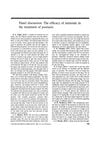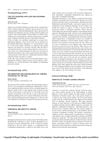
Ayurvedic herbs may reduce side effects and improve effectiveness of cancer treatments.
[object Object]  November 2020 in “Journal of The American Academy of Dermatology”
November 2020 in “Journal of The American Academy of Dermatology” Men with male pattern baldness may be more at risk for severe COVID-19, and anti-androgen treatments could offer protection.
 March 2020 in “Faculty Opinions – Post-Publication Peer Review of the Biomedical Literature”
March 2020 in “Faculty Opinions – Post-Publication Peer Review of the Biomedical Literature” Combining nonablative fractional laser with minoxidil was effective for alopecia areata with only one patient relapsing after a year.
January 2020 in “International Research Journal of Ayurveda & Yoga” Stress may contribute to the development of hypothyroidism, and both modern and Ayurvedic treatments can manage the condition.
 April 1982 in “Journal of The American Academy of Dermatology”
April 1982 in “Journal of The American Academy of Dermatology” Retinoids help treat psoriasis effectively, but they can cause side effects and need more research on safe use with other treatments.
69 citations,
July 2002 in “Clinical and Experimental Dermatology” Alopecia areata is influenced by genetics and immune system factors, and better understanding could improve treatments.
 6 citations,
August 2023 in “Fertility and Sterility”
6 citations,
August 2023 in “Fertility and Sterility” The 2023 guideline for PCOS suggests using updated diagnostic criteria, assessing related health risks, and recommends lifestyle changes and specific treatments for symptoms and fertility issues.

A functional medicine approach may help long COVID patients by focusing on adrenal fatigue, gut health, and vitamin D deficiency, using diagnostic tools and lifestyle changes.
 January 2014 in “Pathology”
January 2014 in “Pathology” The document concludes that understanding nail anatomy is key for diagnosing nail diseases, early signs of nail melanoma may allow for less aggressive treatment, and specific genetic mutations are important in thyroid cancer prognosis and treatment.
 January 1982 in “Side effects of drugs annual”
January 1982 in “Side effects of drugs annual” High doses of certain vitamins can cause serious side effects and health risks.
37 citations,
December 2001 in “Journal of the American Academy of Dermatology” Thalidomide significantly improved hair regrowth in a woman with lichen planopilaris.
10 citations,
October 2019 in “Australasian Journal of Dermatology” Secukinumab effectively treated a difficult case of folliculitis decalvans.
 9 citations,
January 2018 in “Journal of the European Academy of Dermatology and Venereology”
9 citations,
January 2018 in “Journal of the European Academy of Dermatology and Venereology” A male patient developed frontal fibrosing alopecia after antiandrogen therapy for prostate cancer.
 1 citations,
May 2024 in “Dermatology and Therapy”
1 citations,
May 2024 in “Dermatology and Therapy” Frontal Fibrosing Alopecia needs better diagnostics and treatments, with dutasteride showing promise.
 April 2024 in “Canadian Journal of Ophthalmology”
April 2024 in “Canadian Journal of Ophthalmology” A woman with advanced eye cancer went into complete remission using a combination of immunotherapy and topical treatments.
 March 2024 in “International journal of pharmaceutical sciences and drug research”
March 2024 in “International journal of pharmaceutical sciences and drug research” Androgenetic alopecia is influenced by various factors and can be treated with medications, procedures, and non-drug methods.
 December 2023 in “European journal of dermatology/EJD. European journal of dermatology”
December 2023 in “European journal of dermatology/EJD. European journal of dermatology” More effective treatments are needed for severe alopecia areata.
 April 2019 in “The journal of investigative dermatology/Journal of investigative dermatology”
April 2019 in “The journal of investigative dermatology/Journal of investigative dermatology” Targeting cholesterol, fatty acids, fibrosis, and mast cells may help treat CCCA.
 July 2003 in “Journal of Cutaneous Medicine and Surgery”
July 2003 in “Journal of Cutaneous Medicine and Surgery” The document concludes that various treatments for skin conditions are effective, but some require further research, and certain factors like gender and lifestyle can influence disease outcomes.
 February 1990 in “Journal of The American Academy of Dermatology”
February 1990 in “Journal of The American Academy of Dermatology” New skin treatments in 1987-1988 showed effectiveness for various conditions, but some had side effects or risks.
 January 1987 in “Journal of steroid biochemistry/Journal of Steroid Biochemistry”
January 1987 in “Journal of steroid biochemistry/Journal of Steroid Biochemistry” Norethisterone (jenapharm) therapy is effective for endometrial cancer.
 4 citations,
June 2007 in “PubMed”
4 citations,
June 2007 in “PubMed” Effective management of PCOS includes lifestyle changes, medication for menstrual regulation, fertility treatments, and cosmetic issue remedies.
 2 citations,
January 2023 in “BioMed Research International”
2 citations,
January 2023 in “BioMed Research International” The secretome from mesenchymal stromal cells shows promise for improving facial nerve injury treatment.
 73 citations,
February 2007 in “The American Journal of Medicine”
73 citations,
February 2007 in “The American Journal of Medicine” PCOS is a common hormonal disorder in women, treated with lifestyle changes and medications like hormonal contraceptives and metformin.
 9 citations,
December 2022 in “Phytomedicine”
9 citations,
December 2022 in “Phytomedicine” More high-quality research is needed to recommend flavonoids and saponins for clinical use.
 4 citations,
November 2023 in “Frontiers in immunology”
4 citations,
November 2023 in “Frontiers in immunology” New treatments targeting T-cell pathways are needed for better alopecia areata management.
[object Object]  July 2003 in “Journal of Cutaneous Medicine and Surgery”
July 2003 in “Journal of Cutaneous Medicine and Surgery” Some medications can improve skin conditions, while lifestyle factors like smoking and drinking may worsen them; treatments like monoclonal antibodies and imiquimod cream show promise for certain skin diseases.
 July 2003 in “Journal of Cutaneous Medicine and Surgery”
July 2003 in “Journal of Cutaneous Medicine and Surgery” Treating psoriasis with UVB light three times a week is faster than twice a week, and certain medications and lifestyle factors affect psoriasis treatment outcomes.
 82 citations,
May 2016 in “Best Practice & Research in Clinical Obstetrics & Gynaecology”
82 citations,
May 2016 in “Best Practice & Research in Clinical Obstetrics & Gynaecology” The conclusion is that managing androgen excess requires long-term treatment, including hormonal contraceptives and androgen blockers, with follow-up after six months.
 September 2022 in “Women's healthcare”
September 2022 in “Women's healthcare” PCOS is managed by lifestyle changes and personalized medication to improve symptoms and fertility.


























